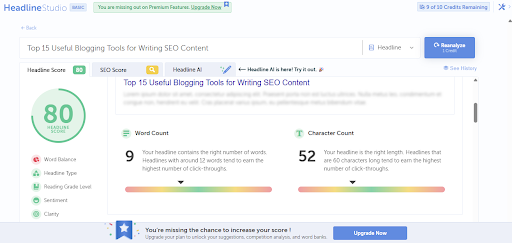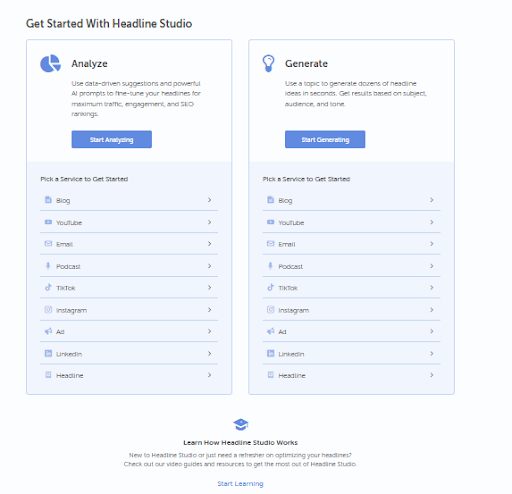Creating high-quality, SEO-friendly content takes time, effort, and the right tools. Whether you are a beginner or an experienced blogger, using the right blogging tools can help you write better, faster, and more effectively.
These tools make your content clear, readable, and optimized for search engines. Here are the top 15 useful blogging tools that every content creator should know about.
Research and Planning Tool to
Writing SEO Friendly Blog
1. Google Keyword Planner
Google Keyword Planner is a free tool from Google that helps you find the best keywords for your blog. It shows how often people search for certain words and how competitive they are.
You can use this tool to choose the right keywords that will help your content rank higher on search engines.
How to Use Google Keyword Planner
- Go to Google Keyword Planner.
- Sign in with your Google account.
- Click “Discover new keywords.”
- Type your topic or keyword idea.
- Choose your target country or language.
- Click “Get results.”
- Check search volume, competition, and keyword suggestions.
- Pick the best keywords for your blog.
Feature | Details |
Purpose | Find popular and relevant keywords |
Best For | Keyword research and SEO planning |
Price | Free |
Website |
2. SurferSEO
SurferSEO is an advanced SEO tool that helps you optimize your blog content based on data. It compares your content with top-ranking pages and gives suggestions for keyword usage, headings, and structure. It’s very helpful for improving on-page SEO.
Feature | Details |
Purpose | On-page SEO optimization |
Best For | Keyword density and structure analysis |
Price | Paid |
Website |
3. AnswerThePublic
AnswerThePublic is a great tool for finding content ideas. It shows what questions people are asking about a topic. You can use those questions to create blog posts that answer what your audience wants to know.
Feature |
Details |
|
Purpose |
Find content ideas and audience questions |
|
Best For |
Topic research |
|
Price |
Free & Paid |
|
Website |
4. SEMrush
SEMrush is a powerful SEO and marketing tool that helps you with keyword research, competitor analysis, and backlink tracking. It also shows how your blog is performing and gives ideas to improve your SEO strategy.
Feature | Details |
Purpose | Full SEO and marketing analysis |
Best For | Professionals and agencies |
Price | Paid |
Website |
5. Ahrefs
Ahrefs is another leading SEO tool that helps you find keywords, analyze backlinks, and check your competitors. It is very useful for understanding what kind of content is ranking well and how to make your own blog perform better.
Feature | Details |
Purpose | Keyword and backlink analysis |
Best For | SEO research and content strategy |
Price | Paid |
Website |
6. Trello
Trello is a project management tool that helps you organize your blogging schedule. You can create boards for topics, deadlines, and tasks. It’s perfect for planning your content calendar and staying consistent.
Feature | Details |
Purpose | Task and content organization |
Best For | Blog planning and teamwork |
Price | Free & Paid |
Website |
7. Ubersuggest
Ubersuggest by Neil Patel is a great keyword and SEO tool for bloggers. It shows search volume, keyword ideas, and even how difficult it is to rank for certain words. It’s an excellent tool for finding new blog topics and optimizing old posts.
Feature |
Details |
|
Purpose |
Keyword and SEO research |
|
Best For |
Beginners and bloggers |
|
Price |
Free & Paid |
|
Website |
Tools Needed During Writing Time to Write SEO Friendly Blog
8. Grammarly
Grammarly is a must-have writing assistant. It checks your grammar, spelling, and sentence structure. It also gives suggestions to make your writing clear and easy to read. The premium version also checks tone and word choice to make your content sound more professional.
Feature | Details |
Purpose | Grammar and writing improvement |
Best For | Error-free and professional writing |
Price | Free & Paid versions |
Website |
9. Hemingway Editor
The Hemingway Editor helps you write in a simple and clear way. It highlights long and complex sentences and shows where you can improve. This tool is great for writing content that is easy for everyone to understand.
Feature | Details |
Purpose | Improve readability and simplicity |
Best For | Writing easy-to-understand content |
Price | Free online tool |
Website |
10. Yoast SEO
If you use WordPress, Yoast SEO is one of the best plugins for optimizing your content. It checks your blog for keyword use, readability, and meta descriptions. It also helps you manage your SEO titles and internal linking.
How Yoast SEO Works (Easy Steps)
- Install the Yoast SEO plugin on your WordPress site.
- Open your blog post in WordPress.
- Scroll down to the Yoast SEO section.
- Add your focus keyword.
- Yoast shows red, orange, or green lights for SEO and readability.
- Follow its tips to improve your content.
- When all lights turn green, your post is well optimized!
Feature | Details |
Purpose | On-page SEO and readability check |
Best For | WordPress users |
Price | Free & Premium |
Website |
11. Google Docs
Google Docs is a simple and free writing platform that allows you to write, edit, and share documents easily. You can work with your team in real time, add comments, and access your content from anywhere.
Feature |
Details |
|
Purpose |
Writing, editing, and sharing content |
|
Best For |
Team collaboration |
|
Price |
Free |
|
Website |
12. CoSchedule Headline Analyzer
A good headline can make a big difference. CoSchedule Headline Analyzer checks your headlines and scores them based on emotion, structure, and clarity. It helps you create headlines that attract more clicks.
Example - I have added “Top 15 Useful Blogging Tools for Writing SEO Content” in CoSchedule Headline Analyzer, and it provided me result this way:

The time we have “Sign Up” in this tool, they have given us 10 Free Credits to experience it. It has both Free and paid versions, you can use whichever suits your requirements.
The tool has other built-in tools as well, which you can leverage, such as:

Feature | Details |
Purpose | Analyze and improve blog titles |
Best For | Creating catchy headlines |
Price | Free and Paid |
Website |
13. ChatGPT
ChatGPT is an AI writing assistant that helps you brainstorm ideas, create outlines, and even write full blog drafts. It’s great for saving time and improving productivity. You can use it to overcome writer’s block and polish your content.
Feature | Details |
Purpose | Content writing and idea generation |
Best For | Bloggers and marketers |
Price | Free & Paid |
Website |
Designing Tools For Graphics and Images to Write SEO Friendly Blog
14. Canva
Canva helps you create beautiful images, blog banners, and infographics without needing design skills.
You can use it to make your blog posts more attractive and engaging. Visuals help your readers stay longer and improve your content’s appeal.
Feature | Details |
Purpose | Design visuals for blogs and social media |
Best For | Creating images and infographics |
Price | Free & Paid plans |
Website |
Tools To Analyse Content After Publishing
15. Google Analytics
Google Analytics helps you track your blog’s performance. You can see how many people visit your site, how long they stay, and which pages they like the most.
This data helps you understand your audience and create better content.
Feature | Details |
Purpose | Measure blog performance |
Best For | Tracking visitors and engagement |
Price | Free |
Website |
Conclusion
Using the right blogging tools can save time, improve quality, and make your content SEO-friendly.
From keyword research and grammar checks to content design and analytics, each tool plays an important role in your blogging journey. Start by picking a few that match your needs and grow from there.
If you want expert help with content creation, SEO, and digital marketing, Kings Digital offers complete solutions to boost your online presence and help your business grow.
With the right strategy and tools, your blog can reach more people and achieve real results.





